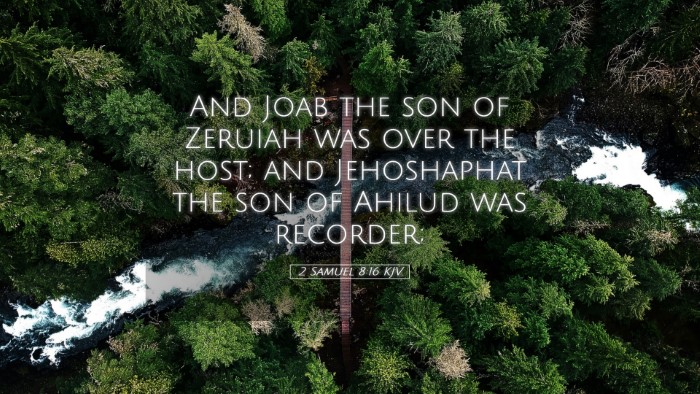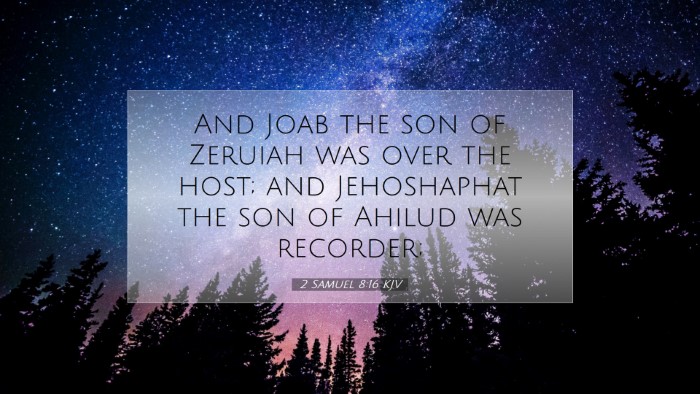Old Testament
Genesis Exodus Leviticus Numbers Deuteronomy Joshua Judges Ruth 1 Samuel 2 Samuel 1 Kings 2 Kings 1 Chronicles 2 Chronicles Ezra Nehemiah Esther Job Psalms Proverbs Ecclesiastes Song of Solomon Isaiah Jeremiah Lamentations Ezekiel Daniel Hosea Joel Amos Obadiah Jonah Micah Nahum Habakkuk Zephaniah Haggai Zechariah Malachi2 Samuel 8:16
2 Samuel 8:16 KJV
And Joab the son of Zeruiah was over the host; and Jehoshaphat the son of Ahilud was recorder;
2 Samuel 8:16 Bible Commentary
Commentary on 2 Samuel 8:16
Verse: "And Joab the son of Zeruiah was over the host; and Jehoshaphat the son of Ahilud was recorder." (2 Samuel 8:16)
Introduction
This verse provides a glimpse into the administrative structure of David's kingdom. It mentions key figures in David's reign, highlighting their roles and the importance of order in leadership. An exploration of this text leads us to understand the significance of these individuals and the implications of their positions within the broader narrative of the monarchy.
Key Figures
The mention of Joab and Jehoshaphat introduces two critical characters in the narrative of King David's reign.
- Joab: As the commander of David's army, Joab was a man of significant military prowess and authority. His leadership not only contributed to the victories that defined David's rule but also exposed the moral complexities of leadership, particularly through his ruthless actions and personal vendettas.
- Jehoshaphat: The role of Jehoshaphat as 'recorder' suggests a position akin to a secretary or historian, tasked with keeping records of events, military successes, and the history of the kingdom. His role underscores the importance of documentation and the preservation of history within the context of Israel’s monarchy.
Theological Implications
The structuring of leadership in David’s court as outlined in this verse has several theological implications:
- Divine Order: God’s anointing of David as king established a divinely ordained order in which leaders had specific roles that contributed to the overall governance of God's people.
- Human Agency: The characters of Joab and Jehoshaphat illustrate the complex interplay between divine sovereignty and human action, where God’s will is fulfilled through the decisions and actions of individuals.
- Legacy and Memory: Jehoshaphat's recording of events emphasizes the importance of remembering God’s faithfulness in victories and challenges, reflecting a central theme in biblical theology regarding the need to remember God's works.
Historical Context
Understanding the political and military context of 2 Samuel is essential. After consolidating his power and defeating his enemies, David needed competent leaders to maintain order and stability. Joab’s victories against various foes established David’s reputation, while Jehoshaphat's role signifies the importance of orderly governance and the recording of Israel’s history.
Exegesis
In this verse, the original Hebrew text uses specific terms that can yield deeper insights:
- The use of "host" signifies a well-organized military structure, reflecting the seriousness of military matters in David's administration.
- Semiotic analysis of "recorder" indicates more than mere note-taking but involves the safeguarding of Israel’s narrative and identity, serving both as a leader and historian.
Lessons for Today
For pastors, theologians, and students of Scripture, this verse and its details highlight several enduring lessons:
- Importance of Leadership: Just as David surrounded himself with competent leaders, so too must contemporary churches prioritize wise and godly leadership structures.
- Understanding History: The role of recording significant events is crucial for understanding our faith journeys today. Students of theology must be diligent in documenting and remembering God’s dealings in their lives and communities.
- Morality in Leadership: Joab’s complex character invites discussions on the nature of right and wrong in leadership and the necessity for accountability among those in positions of authority.
Conclusion
2 Samuel 8:16 provides a brief yet profound insight into King David's administrative strategy, illustrating the roles of Joab and Jehoshaphat during his reign. The administrative decisions taken in the biblical narrative speak to the importance of godly leadership throughout history and offer timeless principles relevant for clergy and laypersons alike.


